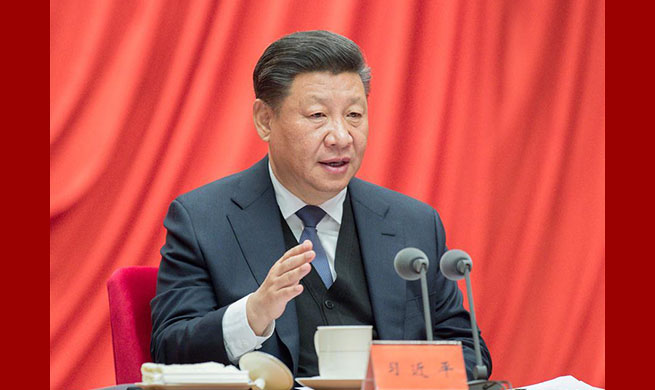LONDON, Jan. 11 (Xinhua) -- The British economy continued its pre-Brexit slowdown in the GDP growth rate, with the rolling three-month rate continuing to decline from a peak seen in the summer, according to official figures released on Friday.
The rolling three-monthly growth rate for the period of September to November in 2018 was 0.3 percent, according to the Office of National Statistics (ONS).
"This is the weakest since last May. GDP got a boost over the summer from the hot weather and catch-up from the first quarter," Dr Howard Archer, chief economic adviser to EY ITEM Club, London-based economic forecasting group, told Xinhua in an interview on Friday afternoon.
"It does look like the economy has stepped down a gear in the last few months and that is no surprise, with Brexit uncertainty becoming ever more to the fore and that has led to some caution particularly among businesses over investment," Archer added.
However, the monthly GDP growth figures showed a different story, with growth in November over the October figures of 0.2 percent, beating the consensus expectations of economists for 0.1 percent growth.
November's monthly growth was driven largely by the dominant services sector, representing nearly 80 percent of the economy, with growth broadly based, and driven by retail, wholesale, and auto trading, boosted by strong pre-Christmas retail sales.
"The monthly figure for November was a little bit better than expected, and was up from 0.1 percent in October and a flat performance in September and that was largely the service sector growing by 0.3 percent month on month --but monthly GDP figures are volatile," said Archer.
Growth in the manufacturing sector continued to follow the downward trend seen in other European economies, such as Germany and France, with a monthly decline of 0.4 percent in industrial production, with declines across all sub-sectors.
"The main disappointment in the November figures was a further fall in the manufacturing sector, which has been a sector that has been struggling not just in the UK but in most countries -- that seems to be a global trend," Archer said.
Construction sector growth rebounded at 0.6 percent monthly growth, with the recovery from weakness in October driven by new work on private sector homes, but public sector construction continued to contract.
"It is hard to argue against the idea that the economy suffered a loss of momentum over the latter part of last year. This is a pattern which has been shared with most other major economies, but the UK's experience appears to have been exacerbated by the damage to sentiment from ongoing uncertainty around Brexit," said economist Andrew Goodwin of Oxford Economics.
UK economic growth looks set to slow to a quarterly rate of 0.3 percent in the fourth quarter of 2018 from 0.6 percent in the third quarter, according to data from the National Institute of Economic and Social Research (NIESR), an independent economics think-tank in London.
There were several factors at play in the sharp slowdown, but that Brexit-related uncertainty was not primary, as there is a global slowdown of both services and manufacturing -- the UK is part of that, Amit Kara, head of UK macroeconomic forecasting at the NIESR, told Xinhua.
Kara forecast economic growth in the first quarter of 2019 will yield a modest improvement as the manufacturing sector stabilized.
Kara said: "Going forward we feel that the first quarter of 2019 will see growth of about 0.4 percent on the previous quarter. We will see services sector growth staying stable, and manufacturing sector which appears to have shrunk quite sharply in Q4 of 2018 will stabilize in Q1."
However, Brexit uncertainties and their effects on economic performance could become more noticeable, Kara said.













